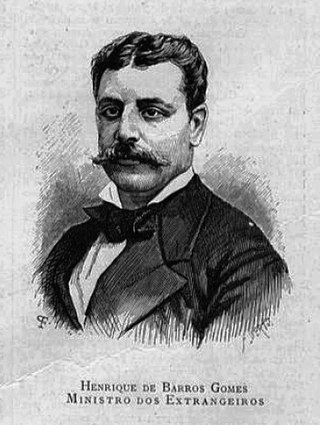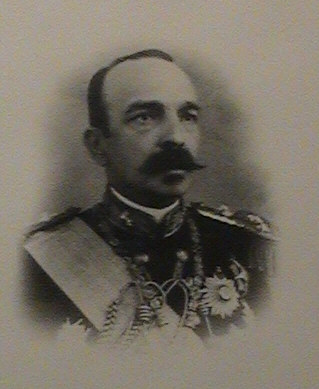
Marcelo José das Neves Alves Caetano was a Portuguese politician and scholar. He was the second and last leader of the Estado Novo after succeeding António de Oliveira Salazar. He served as prime minister from 1968 to 1974, when he was overthrown during the Carnation Revolution.

The Federação Pernambucana de Futebol, once named Liga Esportiva Pernambucana, also known by the acronym FPF, organizes and administers the Campeonato Pernambucano, the Copa Pernambuco, the Campeonato Pernambucano Série A2 and the Campeonato Pernambucano Série A3). It was founded in 1915. Carlos Alberto Oliveira was the president of FPF until his death on August 29, 2011 being replaced by Evandro Carvalho.
Since the beginning of liberalism in Portugal in the 19th century, several parties have, by gaining representation in parliament, continued the liberal ideology in contemporary Portuguese politics. But after the initial fervor of the Liberal Revolution of 1820 and the outcome of the Liberal Wars (1828–1834) during the 19th century, liberalism was relegated to a secondary role in Portuguese politics and government and even outlawed for periods of time. The first fully-fledged liberal party founded as such to have a seat in the Portuguese Parliament since the end of the First Portuguese Republic (1910–1926), was the Liberal Initiative, in 2019.

The Brazilian Social Democracy Party, also known as the Brazilian Social Democratic Party or the Party of Brazilian Social Democracy, is a political party in Brazil. As the formerly third largest party in the National Congress, the PSDB was the main opposition party against the Workers' Party (PT) administrations of Luiz Inácio Lula da Silva and Dilma Rousseff from 2003 to 2016.

Progressistas is a centre-right to right-wing political party in Brazil. Founded in 1995 as the Brazilian Progressive Party, it emerged from parties that were successors to ARENA, the ruling party of the Brazilian military dictatorship. A pragmatist party, it supported the governments of presidents Fernando Henrique Cardoso, Luiz Inácio Lula da Silva, Dilma Rousseff, Michel Temer and Jair Bolsonaro. Largely it was the party of the politics of Paulo Maluf, a former governor and mayor of São Paulo. Of all political parties, in corruption investigation Operation Car Wash, the Progressistas had the most convictions.
Cidadania is a Brazilian political party. It was originally founded as the Popular Socialist Party by members of the former Brazilian Communist Party (PCB), as a centre-left social democratic and democratic socialist party. Despite its left-wing alignment, PPS moved to be opposition against the Workers' Party since 2004, forming alliances with centre-right parties, in particular the Brazilian Social Democracy Party (PSDB), and supporting the Impeachment of Dilma Rousseff. Later the party's National Convention adopted the new naming in March 2019, and it was later approved by the Superior Electoral Court that September. The party then began moving towards a more social liberal position akin to the third way.

Joaquim Teófilo Fernandes Braga was a Portuguese writer, playwright, politician and the leader of the Republican Provisional Government after the overthrow of King Manuel II, as well as the second elected president of the First Portuguese Republic, after the resignation of President Manuel de Arriaga.
Marshal is the highest rank in both the Brazilian Army and the Brazilian Air Force, although the latter is titled marechal-do-ar. These ranks are equivalent to that of grand admiral in the Brazilian Navy. A marshal is distinguished by using five stars, which for a marshal of the air are in the approximate position of Southern Cross and for a marshal in the army, in the form of "X". The five stars of admiral are in the shape of a pentagon.

Henrique de Barros Gomes, was a Portuguese politician, member of the Progressive Party, who assumed the functions of director of the Bank of Portugal, Minister of various Ministries during Regeneration Era politics and member of the Geographic Society of Lisbon, as well as diverse national and international awards of merit. He was noted for his role during the colonial crisis associated with British Ultimatum.

José Maria de Alpoim Cerqueira Borges Cabral was a politician, member of the Progressive Party of Portugal, and later the Republican Party of Portugal, who held various roles during the last years of the constitutional monarchy in Portugal. He was a deputy in the Cortes, Counsel and Peer of the Realm, as well as holding positions in the Ministry of Justice, as well as roles in the First Portuguese Republic.
Conservatism in Brazil designates the movement originated from certain cultural traditions of Brazil, as well as the relationship with Portuguese-Iberian cultural roots and diverse influences. The movement received influences from Roman heritage and part of Greek philosophy in its foundation in Christianity.

O Profeta is a Brazilian telenovela produced and aired by TV Globo between October 16, 2006 and May 11, 2007. It is adapted by adapted by Thelma Guedes and Duca Rachid, based on the 1977 telenovela of the same name.

Sebastião Custódio de Sousa Teles, also known as Sebastião Teles, Sousa Teles, or in contemporary Portuguese as Sousa Telles, was a Portuguese politician and military officer. After a career in military logistics and education, he served multiple times as Minister of War, and briefly as President of the Council of Ministers from 11 April to 14 May 1909 during the penultimate year of the Portuguese constitutional monarchy.
The Liberal Democratic Order is a São Toméan political party, officially founded after the 2014 general elections, in São Tomé, by a group of citizens outraged by what they regard as the cyclical political crisis in the country and the current inability of the ruling class to manage public affairs in a transparent, orderly and productive manner.
Por Toda Minha Vida is a Brazilian television series produced and broadcast by Rede Globo. His first episode aired on December 28, 2006. It is the Brazilian television series with the most nominations to the Emmy Award.

The Constituent Cortes of 1820, formal title The General and Extraordinary Cortes of the Portuguese Nation, also frequently known as the Sovereign Congress or the Cortes Constituintes Vintistas, was the first modern Portuguese parliament. Created after the Liberal Revolution of 1820 to prepare a constitution for Portugal and its overseas territories, it used a different system from the traditional General Cortes for choosing representatives, and the three traditional feudal estates no longer sat separately. The Cortes sat between January 24, 1821 and November 4, 1822 at the Necessidades Palace in Lisbon. The work of the Constitutional Cortes culminated in the approval of the Portuguese Constitution of 1822.

The Brazil Union is a liberal-conservative political party in Brazil. The party was founded on 6 October 2021 through the merger of the Democrats (DEM) and the Social Liberal Party (PSL). The merger resulted in the biggest party in Brazil, and was approved by Brazil's Superior Electoral Court on 8 February 2022.










